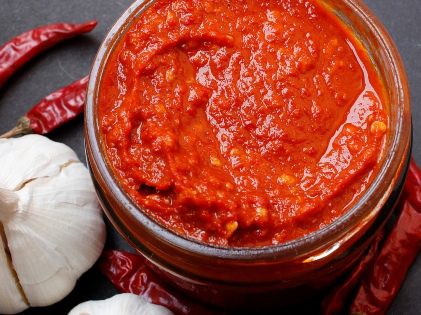
Love Hot Sauce? You Should Know These Surprising Benefits Before Heading To The Condiments Section

Hot sauce is a condiment, salsa, or seasoning prepared from chili peppers. Hot sauces can be a great addition to give your foods that spicy kick. You can add hot sauce to burgers, eggs, tacos, marinades, and burritos. Chemicals called capsaicinoids contribute to the hot flavor of chili peppers. Several types of commercial hot sauces are available.
Humans have been using chili peppers and other hot spices for thousands of years. Despite hot sauces’ popularity worldwide, many people are unsure what effects this stuff can have on their health. Here are some amazing nutritional benefits of hot sauce which you didn’t know about.
Hot Sauce Has More Nutritional Value Than You Think

Hot sauce is pretty low in calories. 5 ml (1 teaspoon) of hot sauce contains 0.5 calories. It has 0 grams of protein, 0 grams of carbs, and 0 grams of fat. From 5 ml of hot sauce, you get 4% of the daily value of Vitamin C. Since we use the hot sauce in small amounts, you get low amounts of vitamins and minerals.
Vitamin C, a water-soluble vitamin that helps boost immunity, is available in a small amount. Vitamin C is also a powerful antioxidant protecting your body against inflammation by neutralizing free radicals.
Hot Sauce Contains Capsaicin
Capsaicin is a compound that adds a spicy kick to the sauce. Capsaicin has a lot of benefits such as pain relief, decreased inflammation, weight loss, cancer prevention, etc. You can apply capsaicin topically to alleviate pain. The compound stimulates the pain receptors and might treat diabetic neuropathy and rheumatoid arthritis. Capsaicin boosts your metabolism, decreases appetite, and improves fat burning. All these aids in weight loss.
As per test tube studies, capsaicin helps in fighting against inflammation. Also, several studies have claimed that capsaicin may help decelerate the growth and spread of certain cancer cells. Hot sauce is usually used in small amounts, like 5 ml to 10 ml at a time. As most studies take high doses of this compound, it can’t be sure how much hot sauce you need to add to get identical results. The hot sauce might have a few side effects due to capsaicin’s presence in it. It can lead to stomach cramps, acid reflux, as well as a burning sensation.
Hot Sauce May Contain High Quantities of Sodium

Hot sauce may contain high amounts of sodium. However, sodium might differ from one brand and service size to another. From 5 ml of hot sauce, you get 124 mg of sodium. A majority of regulatory organizations in Canada, the United States, and the United Kingdom suggest that you should keep your daily intake of sodium below 2400 mg.
Reducing your sodium intake is highly recommended if you have high blood pressure. That will help you prevent stroke and heart attack. Some people are more sensitive to salt compared to others. If you are sensitive to salt, you might want to have a very small amount of hot sauce. Compared to other condiments, hot sauce has low amounts of sodium. And can be a part of a diet that’s good for your heart.
How Can You Choose a Perfect Hot Sauce for Your Health?

You already know by now that you can add hot sauce to your diet anytime you want. However, it would help if you kept in mind that one variety of hot sauces might differ.
Certain types of hat sauce are available in high in sodium and additives, along with other ingredients that can have a detrimental effect on your health.
Therefore, you should always go through the nutrition label and buy a hot sauce that has low sodium. Also, stay away from products that contain preservatives or food dyes. Those are harmful to you. Choose a hot sauce with peppers, spices, vinegar, and salt.
Though the authentic hot sauce is generally good for health, make it a point to check out if it is high in sodium and contains additives that are not natural. As a rule of thumb, always read food labels carefully before adding them to your cart.
More in Nutrition & Weight Loss
-
`
Why Did Chris Pratt Call Anna Faris Before Proposing to Katherine?
Chris Pratt, the beloved star of “Guardians of the Galaxy,” made headlines when he revealed that he called his ex-wife, Anna...
December 3, 2024 -
`
6 Proven Tips to Tackle Insurance Claim Denials Successfully
Claim denials are a common hurdle for healthcare providers and professionals, even for those who follow the necessary procedures to avoid...
December 1, 2024 -
`
5 ‘Bad’ Fitness TikTok Trends You Shouldn’t Follow
TikTok has become a haven for creative fitness advice. But not all trends are worth your time or your health. From...
November 23, 2024 -
`
Does Drinking Water Affect Adrenal Hormones?
Drinking water is often seen as a simple way to stay hydrated, but it has deeper effects on our body than...
November 14, 2024 -
`
Why We Feel the Loss of Celebrities So Deeply?
Celebrity grief might sound strange at first. After all, most of us have never met these famous figures in person, yet...
November 5, 2024 -
`
Are High Deductible Insurance Plans as Ideal as They Appear to Be?
High deductible insurance plans have been a hot topic for years, especially as healthcare costs continue to rise. For many Americans,...
October 31, 2024 -
`
How Training Load Data Can Transform Your Exercise Routine
Tracking progress during workouts is challenging. Simple metrics like mileage or time don’t show the whole picture. Understanding the overall effort...
October 26, 2024 -
`
Katy Perry’s Weight Loss Journey: Secret Diet Tips Revealed
Katy Perry’s weight loss journey has been making headlines, with the pop star shedding 20 pounds over the past few months....
October 16, 2024 -
`
Celebrity Trainer Jeanette Jenkins Shares 5 Key Workout Motivations
Jeanette Jenkins is one of the most sought-after celebrity trainers, known for her ability to motivate and inspire people to achieve...
October 8, 2024















You must be logged in to post a comment Login